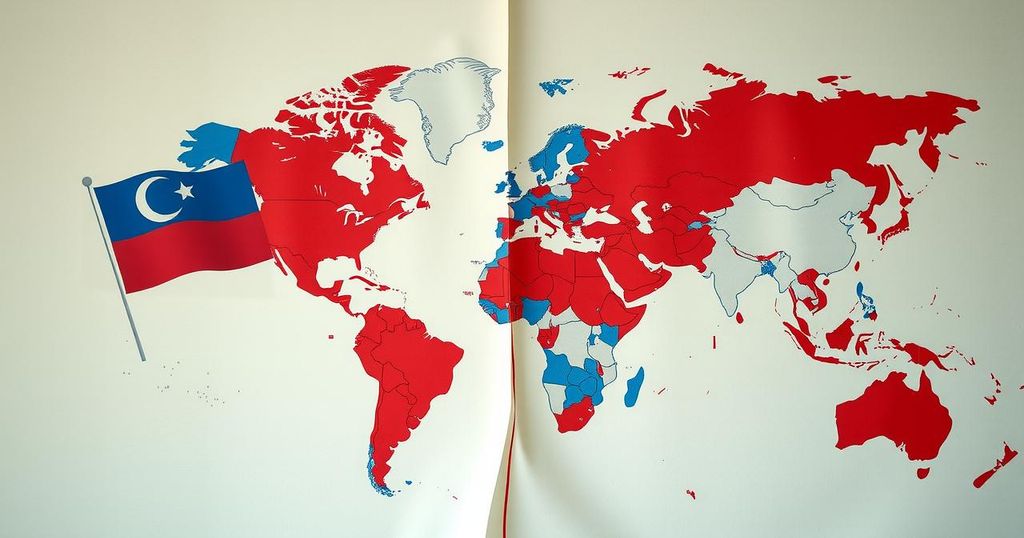World news
AFGHANISTAN, AL - QAIDA, ASIA, ASSAD, BASHA, CONFLICT, CONSTITUTIONAL COURT, DAMASCUS, DONALD TRUMP, ERDOGAN, EUROPE, EUROPE/ASIA, GAZA, GAZA STRIP, HAYAT TAHRIR AL - SHAM, IRAN, IRAQ, ISRAEL, KABUL, LEBANON, MIDDLE EAST, MOSUL, NATO, NORTH AMERICA, REC, REFUGEE CRISIS, ROMANIA, RUSSIA, SYRIA, SYRIAN CIVIL WAR, SYRIAN CONFLICT, TAIWAN, TURKEY, UKRAINE, UNITED STATES, WAR
David O'Sullivan
0 Comments
Geopolitical Shifts: Assad’s Ouster, Romanian Democracy, and Future Challenges
The article reviews key geopolitical events: Assad’s recent removal from power, the cancellation of an election in Romania due to disinformation, potential shifts in U.S. foreign policy under Trump, and speculation on Russia’s future leadership. It advocates for a multi-party political system in the U.S. and underscores the value of the United Nations while highlighting the need for awareness of the effects of artificial intelligence in society.
The recent ousting of Bashar Assad, long seen as a central figure in Syria’s political landscape, comes amidst a backdrop of international distraction. His regime, sustained by Iran and Russia, faced an opportune moment of vulnerability as those allies were preoccupied with their own conflicts. While the removal of such an oppressive leader, responsible for hundreds of thousands of deaths and massive humanitarian displacement, appears beneficial, doubts linger regarding his replacement. The group now emerging, Hayat Tahrir al-Sham (HTS), was initially linked to al-Qaida and remains controversial, raising concerns about future governance in Syria.
In Romania, a notable first occurred when the Constitutional Court annulled an election due to a disinformation campaign attributed to external forces, particularly from Russia. This unprecedented decision has sparked debate about the court’s integrity and the implications for democracy in Romania. Whether future elections will be free from such influence remains uncertain, as public trust in the political system may suffer long-term repercussions.
The geopolitical landscape also shifts with discussions about the potential implications of a second Trump presidency on Taiwan and Ukraine relations. Analysts suggest that Trump’s focus on negotiating a ceasefire in Ukraine may not directly alter China’s stance on Taiwan, as Beijing continues to recalibrate its long-term strategic goals. Meanwhile, the prospect of a Russia without Putin raises questions about continuity versus change in leadership dynamics, with expected successors likely to maintain anti-Western policies.
On the subject of American politics, a move towards a multi-party proportional representation system could, in theory, mitigate divisive tribalism although achieving such a transition is fraught with challenges. The United Nations, despite its bureaucratic flaws, is lauded for its humanitarian efforts and global initiatives, showing value in its existence beyond critiques.
Looking forward, significant discussions surrounding the integration of artificial intelligence into daily life need deeper consideration to comprehend its implications on societal structures. Media sources that promote diverse global perspectives, like CBC and DW, are vital for a well-rounded understanding of current events. Lastly, on a lighter note, culinary preferences such as the inclusion of pineapple on pizza may evoke personal taste debates, but they offer no real impact on the complexities of international relations.
The article discusses several critical geopolitical developments including the ousting of Bashar Assad, the implications of political decisions in Romania, and the effects of former President Trump’s potential re-election on international policy regarding Taiwan and Ukraine. It also delves into Russia’s future post-Putin and proposes a shift in the American political landscape towards a more pluralistic representation. Furthermore, the article highlights the importance of the United Nations in global governance and humanitarian efforts, while also touching on the future of artificial intelligence and the importance of diverse news sources in understanding global issues.
In summary, the political shifts occurring in Syria and Romania highlight the fragility of democratic institutions under external pressures and internal strife. The potential for change in U.S. foreign policy under Trump could reshape global strategic dialogues, particularly regarding Taiwan and Ukraine. The continuity of authoritarian regimes in Russia, coupled with America’s political challenges, underscores the need for more inclusive representation. The value of established institutions like the UN remains significant amid criticisms, while discussions about AI and media literacy continue to shape future societal trends.
Original Source: www.gzeromedia.com




Post Comment